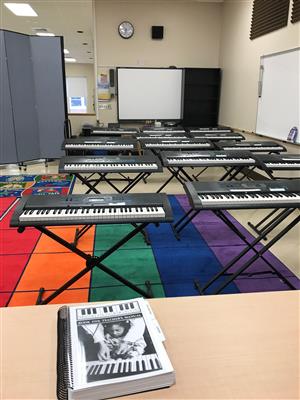- Robert L. Craig School
- Music and the Brain
Music - Ms. Schmidt
Page Navigation
Music and the Brain

-
https://www.musicandthebrain.org
Thanks to a grant provided by the MUSIC AND THE BRAIN foundation, our RLC students have been provided with beautiful electric pianos and wonderful music materials. Our Kindergarten students will start by having Piano Class twice a week, and by exposing students to musical learning at a young age we hope to inspire an analytical and mathematical framework for thinking and creativity!
Here are the Music and the Brain guidelines, and stay tuned for updates!
MATB Teaching Principles
-
Music classes must be interesting.
-
Music is and should be fun.
-
Children want to learn.
-
Children can learn anything you teach them. Aim high. If you offer and expect a lot you will get a lot back. Everyone will benefit from the feeling of progress.
-
Children need to learn to think. Asking questions is much better than lecturing.
-
Listen to your students and learn from them.
-
Be patient. Children do not always react as you think they should or show you, in ways that you like, that they are learning – this doesn’t mean that they are not “getting it”. Do your job and they’ll do theirs.
-
The MATB lessons are more about music than piano.
-
Do not aim to make little pianists out of your students. Some will become great musicians others won’t.
-
Keep the lessons moving along, even if some students are unable to play some pieces. By the end of the year, they will have caught up and in the meantime the classes won’t be boring.
-
Thinking about and managing time well is important. Staying with one activity too long can take all the fun out of it. Not enough explanation can be frustrating.
-
Keep your expectations high.
-
Asking questions is often better than lecturing. A good approach is to have children discover the music.
-
Music and the Brain is taught in school settings with large groups of students most of whom do not have pianos at home. However, they can still learn the song well and take it away with them. Singing, clapping, analyzing and movement are important to the program because they help to glue the materials into the children’s minds.
-
Make time in every class for creativity
-

